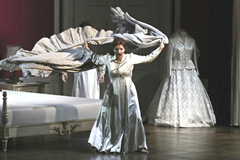| Opera Reviews | 23 April 2024 |
Tristan returns in triumph to the Teatro Regioby Silvia Luraghi |
|
| Wagner: Tristan und Isolde Teatro Regio di Torino 15 October 2017 |
|
|
Instead stage director Claus Guth focused on the passionate love story between the two, and highlighted its intimate facet by setting the action in a 19th century high-middle class apartment. Isolde wakes up in the morning in her bedroom to the nicely sung outside melody, and asks to see Tristan. Brangäne, in a similar long nightgown, at moments exchanges roles with her: in the director’s view, she is Isolde’s Doppelgänger, who pours the love filter for her in order to fulfill her unspoken desire. The sets, designed by Christian Schmidt (who also took care of the costumes), featured a revolving structure that showed the elegantly furnished rooms of the apartment. In this way, the director was able to add some action to this otherwise quite static opera. In the third act, Tristan lies wounded outside the building that now looks fading. At his side, Kurwenal tries to cheer him up, while Isolde’s ship approaches, announced by the sound of an English horn. But Isolde has only time to embrace her lover and go into the dining room with him: Tristan dies while she remains sitting at the table, and ignores the fighting that is still going on around her. In the meantime, five hours has elapsed, and while part of the audience had left the house earlier, there were still enough spectators left to pay a big tribute of applause to all the cast members, who had accomplished the deed of bringing back Wagner’s masterpiece to Turin after a ten-year absence. And this was indeed deserved. As Isolde, Ricarda Merbeth relied on her familiarity with Wagner’s music, and sang with a perfectly tuned voice, especially convincing in the top notes and exhibiting a solid middle range. As her partner Tristan, veteran Peter Seiffert also displayed a perfect technique, which allowed him to project and support the sound of his sizeable voice. Michelle Breedt was a very compelling Brangäne, especially keen on carrying out the Doppelgänger role the director had devised for her. For Maestro Gianandrea Noseda this was the first Tristan. The conductor prepared with great care for this debut, and worked out all the details with the orchestra of the Teatro Regio, which played with commitment and produced a compact, vibrant sound. The chorus, instructed by Claudio Fenoglio, contributed to the success of the performance.
|
|
| Text ©
Silvia Luraghi Photo © Ramella & Giannese / Teatro Regio Torino |

 There was no sea and no ships in the Zurich production of Wagner’s Tristan und Isolde that opened the 2017-18 season at Turin’s Teatro Regio, only a galleon sketched on the wall of a worn out house in the third act reflected Tristan’s anxious wait for Isolde’s ship.
There was no sea and no ships in the Zurich production of Wagner’s Tristan und Isolde that opened the 2017-18 season at Turin’s Teatro Regio, only a galleon sketched on the wall of a worn out house in the third act reflected Tristan’s anxious wait for Isolde’s ship.





